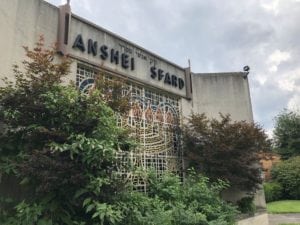A Louisville Metro Council committee voted Tuesday to overturn the historic designation for Anshei Sfard synagogue and sent the matter to the full body for final action.
By a 6-0 vote, with one member not voting, the planning, zoning & annexation committee supported a resolution, which reverses the March 22 decision of the Historic Landmarks Commission to landmark the synagogue and its education center. (Two houses the congregation owns were not included in landmarking.)
The commission voted 5-4 at the time for landmarking. Four commissioners were absent and did not vote.
Before voting on Tuesday, some council members took the opportunity to criticize the existing ordinance under which the landmarks commission must operate.
“We have a landmarks ordinance which makes it very difficult to say no to an application,” Councilman Bill Hollander said. “The ordinance says that if you meet one of the criteria, you are eligible for a landmark…. This is an example of why we do need some changes to the landmarks ordinance.”
Metro Council is expected to act on the resolution at its August 9 meeting.
The resolution that committee adopted sets out five “findings of fact” by the landmarks commission:
- The property and structures at 3700 Dutchmans Lane do not possess any “character, interest, or value as part of the development or heritage” of Louisville;
- Mid-Century architecture, the style in which Anshei Sfard was built, is “ubiquitous” in Louisville and that the property’s front yard setback – one of its design features — does not warrant a designation;
- Only one structure on the property displays distinguishing characteristics of Mid-Century Modern architecture, which is not adequate to justify designation of both structures and the site.
- Joseph & Joseph, the architectural firm that designed Anshei Sfard, is well known in Louisville, but there is no known evaluation of its influence on Mid-Century Modern design; and
- The property and structures do not meet city guidelines, which the landmarks commission uses to make its decisions.
Steve Porter, the attorney representing the petitioners in this case, sad he was “disappointed” by the vote, particularly that it went forward without a public hearing, which the committee has held in previous landmarking cases.
He said a public hearing would have identified “misconceptions” in the resolution; namely, that the landmarks commission had reached any findings of fact.
“The commission made no findings of fact,” Porter said. “They just voted for it.”
But Hollander disputed the need for a public hearing, saying the planning, zoning & annexation committee should make its decision based only on the record.
“I don’t think the lack of a public hearing means we haven’t taken this case seriously,” he said.
Councilwoman Madonna Flood, who chairs the committee, said public hearings should be held only in extraordinary cases.
“I don’t know why we would ever have a public hearing unless there was some type of horrible mitigating circumstance that comes to light,” she said.
Councilwoman Barbara Sexton Smith, who introduced the resolution, said she didn’t asked for a public because there has already been one — conducted by the landmarks commission.
“There has never been any interest on my part because a public hearing has been conducted,” she said. “Full evidence and testimony was provided and taken into consideration.”
She was referring to the March 22 hearing before the landmarks commission. At that time, four people spoke in favor of landmarking and five spoke against.
Anshei Sfard, the congregation that owns the property, opposes landmarking, saying it would hinder its efforts to sell. The Jewish Community of Louisville has made a conditional offer for the property, the condition being that the landmark decision is overturned.
Flood appeared sensitive to the situation of Anshei Sfard, and other owners of property facing landmarking.
The last Orthodox congregation in Kentucky, Anshei Sfard has dwindled over the years. Rabbi Simcha Snaid, its spiritual leader, has said only 35 families remain, mostly senior citizens.
The congregation no longer meets in the building, holding its services at the nearby Shalom Towers. Its members hope to build a new synagogue, which better fits its needs, using revenue from the sale.
Jon Fleischaker, chairman of the JCL board of trustees, said he was pleased with the vote.
“We think the subcommittee made entirely the right decision based on the record before it,” he said. “It is sound, and we hope the entire council adopts that decision.”




